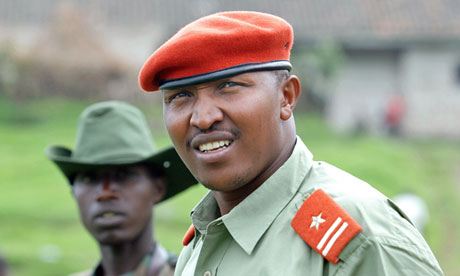Down a bone-jarring dirt track stands an innocuous steel gate and high wall crowned by razor wire. Barely visible beyond is the rooftop of a mansion belonging to one of the world's most wanted men. This is the residence of Bosco Ntaganda, aka "the Terminator", a leading architect of the chaos raging once again in eastern Democratic Republic of the Congo.
Is Mr Ntaganda at home? "He is not here," says a rebel guard: glazed eyes, rifle slung over ill-fitting uniform, pitiably young. "I don't know where he is." Another man in a T-shirt and jeans emerges with an air of menace: "You can go now."
Ntaganda, about 40, is the subject of two arrest warrants from the international criminal court, whose chief prosecutor says he is just as dangerous as Joseph Kony – the globally infamous Ugandan warlord. Human Rights Watch has said: "Congo is full of war criminals, but the ICC arrest warrants put Ntaganda in a different league."
He is now described as the leader of M23, a rebel movement accused of serial atrocities on its way to capturing the major eastern city of Goma. Yet when M23 commanders paraded triumphantly through the streets last Tuesday, Ntaganda was nowhere to be seen. His current whereabouts remain the Congolese rebels' best kept secret.
The days when the Rwandan-born fugitive from international justice swaggered around Goma's best hotels, playing tennis and dining in style, appear to be over. One hotel is run by his cousin and, on Saturday, was guarded by an M23 fighter with green beret, rifle, crackling radio and chest-sack bursting with rockets. "What is this fucking white man doing here?" he snapped at the sight of a western journalist.
The cousin, who gave his name only as Kubi, said he last spoke to Ntaganda seven months ago. "I don't know where he is now," he continued defensively. "He has his business and I have mine. The international community is looking for him – that's why a lot of people don't know."
Whatever the allegations against Ntaganda, Kubi admitted, blood is thicker than water. "I have a good relationship with him. I'm not a politician or a soldier. I like my family. When he's fighting, the family members follow him to the field."
According to some theories, Ntaganda is moving from town to town, helping direct the increasingly successful war against the Congolese army. Others believe he has taken refuge in Rwanda – a country widely accused of supporting M23. But the PR-savvy rebels have moved to distance themselves from the man indicted by the ICC for alleged war crimes and crimes against humanity, including murder, rape, sexual slavery and the recruitment of child soldiers. Their media liaison officer, Colonel Vianney Kazarama, said: "I'm not the spokesman for Bosco Ntaganda. We are not with him."
One of the triggers of Congo's latest crisis was pulled far away, at The Hague eight months ago. It was there that the decade-old ICC claimed its first scalp: the warlord Thomas Lubanga, Ntaganda's former boss. During the trial, a witness testified that as a child he fought alongside Ntaganda, describing him as a man who "kills people easily".
Ntaganda's position as a general in the Congolese army, which is backed by UN peacekeepers, looked increasingly untenable. In April he defected with hundreds of heavily armed soldiers to form M23.
President Joseph Kabila finally bowed to international pressure and called for his arrest, though he said Ntaganda would not be handed over to the ICC, which in July brought extra charges against the general.
Deepening the riddle of his movements since then is the complex internal politics of M23, which draws heavily upon a previous Rwandan-backed rebel militia, the National Congress for the Defence of the People (CNDP). Ntaganda, who once led the CNDP, is said to be at loggerheads with M23's military leader, Sultani Makenga, prompting conjecture that he may have been sidelined or even detained by M23.
The potholed, crumbling road north from Goma runs deep into Ntaganda territory where, according to the UN, he has built a business empire by collecting taxes from charcoal markets, illegal checkpoints and mines controlled by his loyalists. But in the M23 stronghold of Rutshuru, its fighters are elusive on his location.
"I remember him in the CNDP," said one colonel, who did not wish to be named. "He had to do his job. I never saw him recruit children to fight. I last met him in Goma in March and I don't know where he is now. Maybe Kabila knows. People try to say Ntaganda is here, but he's not involved in M23."
Nearby is the village of Kiwanja, where in 2008 Ntaganda was caught by TV cameras commanding his troops as 150 people were massacred in a single day.
Mwendo Mutalubeko lost five children in the carnage. "They came and asked them to go and, when they refused, they shot them, even people asleep in their beds," she recalled, holding a hand to her pained face. "I want to cry again. We are still suffering here. Only God can help us now."
Standing among rudimentary mud and wicker homes, Rubago Lazaro, 67, whose son was murdered, said: "The whole village is crying. We still don't have peace, we still don't sleep. Bosco Ntaganda and his people should face justice."


















